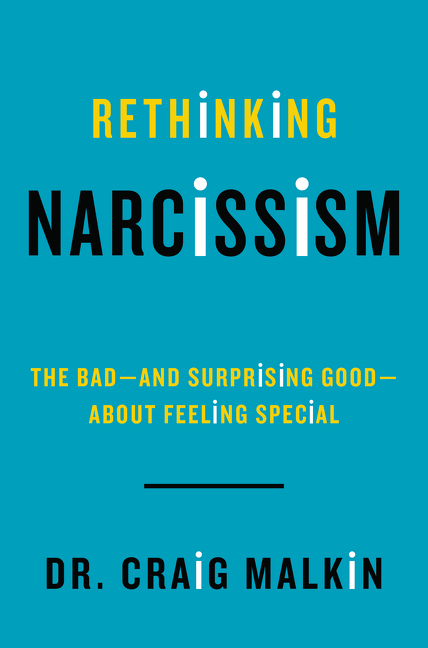Rethinking Narcissism: The Bad—and Surprising Good—About Feeling Special
THE BOOK
Advanced praise for Rethinkning Narcissism
“This is a true gem on the subject of narcissism.” Library Journal
“[Dr. Malkin’s] reassuring tone and plethora of case histories offer considered advice and generous encouragement.” Kirkus Review
“…a book that will have readers rethinking themselves and, paradoxically, those around them.” Publisher’s Weekly
“Dr. Malkin offers a surprising, accessible analysis of narcissism” Gretchen Rubin, best selling author of Better than Before and The Happiness Project
“ [Dr. Malkin} shows us how to…manage relationships with narcissistic partners, friends, colleagues, and family.” TV’s Dr. Drew Pinksy, author of The Mirror Effect
"…an enthralling book…it will become a classic.” Dr. Sue Johnson, bestselling author of Hold Me Tight and Love Sense
“…a book that’s persuasive. Insightful, and never dry.” Dr. Peggy Drexler, author of Raising Boys Without Men and Our Fathers. Ourselves.
Welcome! I’m delighted to announce that my new book, Rethinking Narcissism: The Bad—and Surprising Good—About Feeling Special, (HarperCollins, 2015) is scheduled to hit the shelves in July 2015, and is available to preorder now.
“What is Narcissism?” is one of the fastest-rising searches on Google, and articles on the topic routinely go viral. Yet the word “narcissism” seems to mean something different every time it’s uttered. In fact, the more it’s slung about, the more elusive its true meaning becomes. The only certainty, it would seem, is that it’s bad to be a narcissist—really bad. That’s terrible news for millennials, who’ve been branded “the most narcissistic generation ever.”
In Rethinking Narcissism, Dr. Craig Malkin—a Harvard Medical School Instructor and clinical psychologist with more than two decades of experience—offers a radically new model for understanding this often misused term. Narcissism, argues Dr. Malkin, is essentially a spectrum of self-importance— and everyone falls somewhere on the scale between utter selflessness and total arrogance. When we casually invoke the term “narcissist,” most of us are referring to the shadowy outer edge of the spectrum, which can shade into dangerous psychopathy. Yet there are also those who live at the lower end of the spectrum—dubbed “echoists” by Dr. Malkin. These, too, are people we know; people so fearful of attention or acknowledgment that they often seem to have no voice at all.
Drawing on his own research, as well as the latest findings in psychology, Dr. Malkin uses vivid stories of people from all walks of life to teach concrete strategies for spotting—and coping—with excessive narcissism. At the same time, he explains why embracing some degree of narcissism—the drive to feel special— is essential to maintaining a healthy sense of self-worth. Using his new tool—the Narcissism Test—he not only guides readers through the process of measuring their narcissism, but also offers step-by-step advice to prevent unhealthy narcissism—and nurture healthy narcissism— in ourselves, as well as our partners, our colleagues, our friends, and especially our children.
As practical as it is wise, Rethinking Narcissism doesn’t just help people avoid the temptations and dangers of extreme narcissism—and narcissists—in both the real world and cyberspace; it helps everyone, including people who don’t feel special enough, find their voices and live more passionate, fulfilling lives.
Among the surprising truths and tools you’ll find in Rethinking Narcissism:
Many people worry they might have to leave their partners when they see signs of narcissism. They’ve given up hope that their boyfriend or girlfriends will ever truly care. But few people realize that empathy-deficits aren’t unique to full-blown narcissists. Many things get in the way of our partner’s capacity to care. If you know the right approach, you can test out your loved one’s ability to change. Recent studies suggest you might even be able to help reduce their narcissistic habits. Find out which approaches help decrease unhealthy narcissism—and which don’t, so you can finally answer the question: should I stay or should I go?
Narcissists are notoriously exciting at the start of relationships. They’re often reckless and impulsive, and their brash self-confidence seems to be a turn on, according to research. Many people get drawn back to the most narcissistic people because they feel bored with more caring partners. But there are steps you can take to find excitement in a more secure, stable relationship. Discover how to put the power of your desire back in your own hands—and enjoy excitement even without having a narcissist in your life.
Work relationships are among the most important ones we have, keeping our life happy—or making it hell. Narcissists can be the hardest people to work for and with. It’s tempting just to quit. But there are approaches and steps—and questions you can ask— to decide whether or not your situation is as hopeless as it seems. Find out what they are, and how to survive a narcissistic coworker or boss.
You’ve heard narcissism is on the rise. But is this true? And what does it really mean? And how can we turn the trend around? Learn why empty praise and participation trophies aren’t the biggest problem we face in preventing the widespread arrogance and entitlement that seem to be all around us—and find out what is.
You already know narcissism can wreak havoc in our lives, engendering selfishness, arrogance and even aggression. But did you know it’s possible to have too little narcissism? That some amount of narcissism is healthy—even desirable? You’ll learn not only what causes the worst kinds of narcissism, so you can steer clear of its dangers, but also how to ensure the healthy kind in yourself— and those you love.
Narcissism isn’t an all or none trait. My colleagues and I have been developing a new, researched-backed scale so you can see where you fall in the spectrum. Unlike existing measures, focused only on the dangers of narcissism, this one includes items to help you see how much healthy narcissism you have. With Rethinking Narcissism, you’ll be able to take the test—and find out whether you fall in the healthy or unhealthy range of the spectrum.
You’ll also discover answers to these common questions:
How can we ensure our children don’t become narcissists? What can we do if we’re afraid they already are? Are there parenting approaches that help?
How can you recover after ending a relationship with a narcissist?
What should you do if you think you’re a narcissist?
Are there different kinds of narcissists?
Do social media tools—sites like facebook, myspace, and twitter— cause narcissism?
Narcissism isn’t just a personality trait or a disorder. It’s also an approach to life and love. And once you understand what drives it, you’ll be better prepared to face its dangers—and embrace its rewards.
Preorder your copy today to learn practical tips on how to cope with the bad—and recognize the good—in narcissism, whether you see it in your friends, lovers, family members—or yourself.
Thank you again!
For updates check back frequently–or sign up for Dr. Malkin's newsletter.








